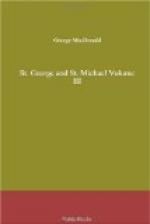And with the word he was neither old man nor marquis any more.
The parliament, with wondrous liberality, voted five hundred pounds for his funeral, and Dr. Bayly tells us that he laid him in his grave with his own hands. But let us trust rather that Anne and Molly received him into their arms, and soon made him forget all about castles and chapels and dukedoms and ungrateful princes, in the everlasting youth of the heavenly kingdom, whose life is the presence of the Father, whose air to breathe is love, and whose corn and wine are truth and graciousness.
There surely, and nowhere else as surely, can the prayer be for a man fulfilled: Requiescat in Pace.
CHAPTER LVI.
Richard and Caspar.
I have now to recount a small adventure, to which it would scarcely be worth while to afford a place, were it not for the important fact that it opened to Richard a great window not only in Dorothy’s history while she lived at the castle, but, which was of far more importance, into the character moulding that history—for character has far more to do with determining history than history has to do with determining character. Without the interview whose circumstances I am about to narrate, Richard could not so soon at least have done justice to a character which had been, if not keeping parallel pace with his own, yet advancing rapidly in the same direction.
The decree of the parliament had gone forth that Raglan should be destroyed. The same hour in which the sad news reached Caspar, he set out to secure, if possible, the treasures he had concealed. He had little fear of their being discovered, but great fear of their being rendered inaccessible from the workshop.
Having reached the neighbourhood, he hired a horse and cart from a small farmer whom he knew, and, taking the precaution to put on the dress of a countryman, got on it and drove to the castle. The huge oaken leaves of the brick gate, bound and riveted with iron, lay torn from their hinges, and he entered unquestioned. But instead of the solitude of desertion, for which he had hoped, he found the whole place swarming with country people, men and women, most of them with baskets and sacks, while the space between the outer defences and the moat of the castle itself was filled with country vehicles of every description, from a wheelbarrow to a great waggon.
When the most valuable of the effects found in the place had been carried to London, a sale for the large remainder had been held on the spot, at which not a few of the neighbouring families had been purchasers. After all, however, a great many things were left unhid for, which were not, from a money point of view—the sole one taken—worth removing; and now the peasantry were, like jackals, admitted to pick the bones of the huge carcase, ere the skeleton itself should be torn asunder. Nor could the invading




